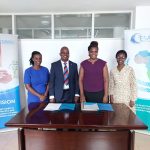ESAWAS in collaboration with the African Water and Sanitation Association (AfWASA) and the Pan-African Association of Sanitation Actors (PASA) held the 1st Service Provider Regulator (SP+R) Engagement Platform convening 50 participants from across Africa in Bujumbura, Burundi from 23rd-24th July 2024.
The SP+R Engagement Platform is born from the growing recognition of the need for regulators and regulated to have a stronger purposed dialogue on the sector’s needs that will foster and facilitate improved performance in service provision. This means co-learning, consulting, and sharing successes, challenges, emerging issues, and good, innovative practices that impact sector performance.
It is in this regard that ESAWAS, AfWASA, and PASA came together under a collaboration framework to establish a common platform for service providers and regulators to interface and listen one from the other through structured dialogue on specific issues that impact service delivery across the continent.

The first engagement comprising 11 regulators and 22 service providers from across Africa discussed the enablers for attaining and sustaining improved performance in access and quality of services. The main emphasis was on exploring the key requirements for accelerating progress towards and post the SDGS.
The SP+ R meeting was opened by the Chairperson of ESAWAS, Mr Balthazar Nganikiye who emphasized the importance of collectively devising practical and workable approaches for the African context in order to advance universal access to quality services. The Executive Secretary of ESAWAS, Ms Yvonne Magawa, the Executive Director of AfWASA, Mr Francois Gosso and the Secretary General of PASA, Mr Bakabulindi Shaka all agree that working and dialoguing together will foster uptake of practices and approaches that address challenges and enhance WSS service delivery at different levels.

“Follow those who know the way” The two-day meeting entailed a series of presentations and plenary discussions on key issues affecting service delivery; policy, legal, regulatory and institutional design that facilitate well performing utilities, attaining efficiency and service resilience; unlocking funding for WSS and closing data gaps.
Some key considerations from the engagement were as follows:
- The beneficial role of regulation was recognised, however regulation need not be complex and there is need to simplify with consideration for the cost of compliance.
- Addressing high Non-Revenue Water remains a top priority for efficiency gains. This was tied to better approaches to metering with smart-metering and prepaid metering explored with varying experiences by countries. Novel technology for automatic leak detection and repair is under exploration in Tanzania. There is need to share working approaches in managing NRW, particularly with regards to commercial losses.
- The is need to attract increased financial investment into the sector with better considerations for tariff modelling and setting. Additionally, the sector needs strategic exploration of innovative financing models, with the example of green bonds by TANGAUWASA of Tanzania. Participants advocated for the development of a water supply and sanitation tariff index for Africa, as well as a Creditworthiness Index for WSS Utilities in Africa.
- The need for credible and reliable data as a bedrock for decision-making could not be overemphasised. Tanzania and Kenya presented digitalisation efforts and integrated systems working at both utility and regulatory levels that are supporting near real-time decision-making for services.
- Regulators and service providers appreciate the need for enhanced capacity building at all levels. The need for skilled workmanship was noted to be a key contributor to attaining improved staff efficiencies
- Benchmarking practices, approaches and KPIs was deemed a critical tool that will enhance the attainment of service provision and efficiency. This was noted from the presentations on practical approaches from across Africa where THIKA WSP CAMWATER and SODECI shared their strategies in addressing NRW, staff efficiencies, metering and collections.
- Service delivery has been highly impacted by climate change, surge in unpredictable economic patterns, migration and other effects. There is need to stay abreast with innovative technologies and data systems to support resilience.
- The inclusion of Policy Makers in the upcoming engagements is a critical voice to implementation of requisite support in country sector governance instruments.
The SP+R Engagement will continue using the digital platform ESAWAS Engage – Regulators Community as a dedicated space for engagement of all WSS professionals, regulators, utilities and youth. The next physical engagement will take place alongside the 22nd AfWASA Congress in Kampala, Uganda in February 2025 and is expected to present progress on actions agreed as well as share good practices under implementation.






